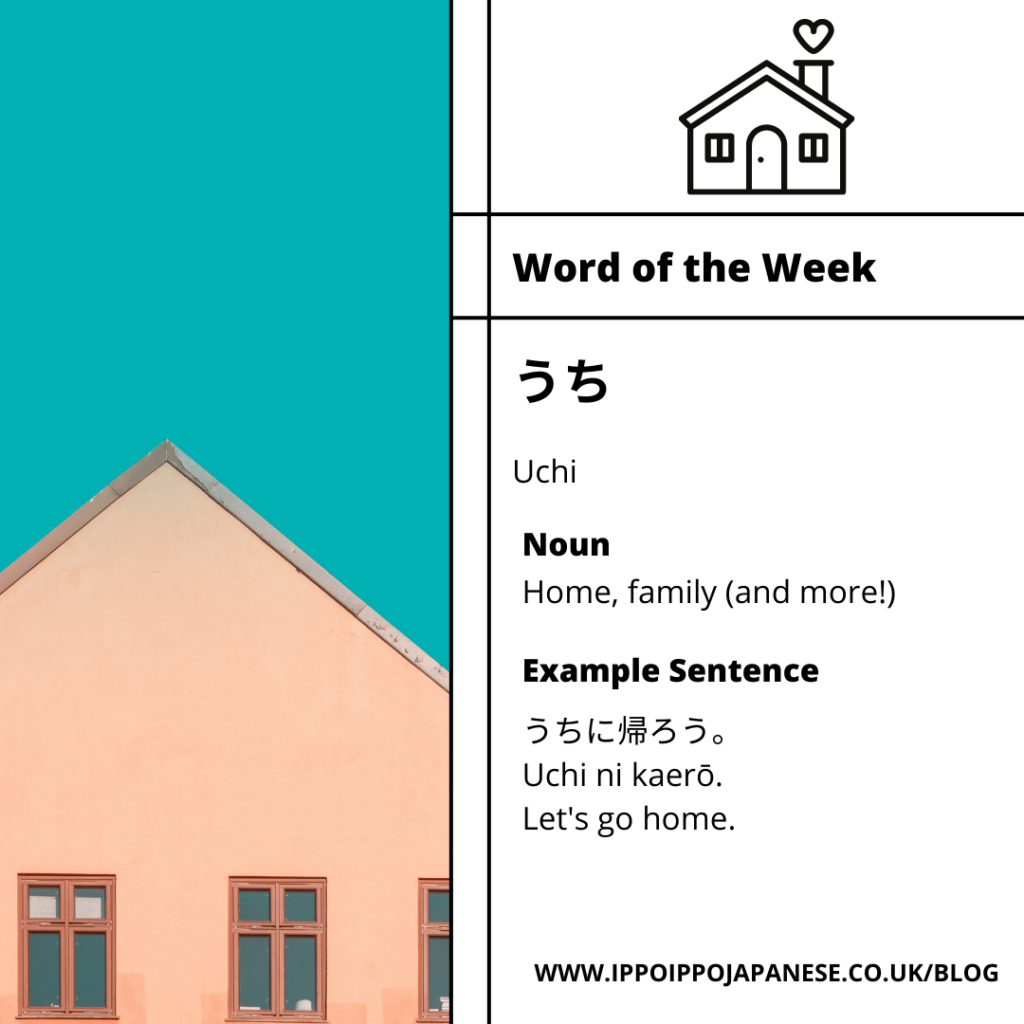Posted: 20th May 2022
Hello and welcome to the Ippo Ippo Japanese Word of the Week!
This week's word is...
うち
Uchi
What does it mean?
うち (uchi) has a lot of meanings! Today we are going to focus on three main ones:
- Home
- Family
- I, me
How is it written?
うち (uchi) is almost always written using hiragana, but can sometimes be written using the kanji 家 when it's used to mean "house". However, this kanji is more often read as いえ (ie). More on this word and how it differs from うち (uchi) below!
Meaning #1: Home
うち (uchi) can be used to mean 'home' in sentences like:
- うちで勉強します (uchi de benkyō shimasu) - [I] study at home
- うちに帰ろう (uchi ni kaerō) - let's go home
- うちをリフォームした (uchi wo rifōmu shita) - I/we renovated my/our house/home
As you can see, there are times when うち (uchi) could be translated as 'house' as well as 'home' in English. However, the key point here is: what do all of the 'uchi's in these examples have in common?
The answer: all of the 'uchi's described above belong to the speaker. In other words, うち (uchi) is used specifically to describe your own home - not that of others.
Note: there are times when this rule may be broken, but for today, let's focus on this general principle!
Meaning #2: Family
While Japanese has a specific word for 'family' (家族 - kazoku), うち (uchi) is another word that can include this meaning.
Let's look at some examples:
- うちの猫は1歳です (uchi no neko wa issai desu) - my/our [family's] cat is one year old
- うちは4人家族です (uchi wa yo-nin kazoku desu) - my/our family is made up of four people
- うちの犬はかわいくて大人しい (uchi no inu wa kawaiku otonashii) - my/our [family's] dog is cute and well behaved
This meaning of うち (uchi) is partially related to the word for 'inside' or 'inner'. While this word is also pronounced うち (uchi), it's written with the kanji 内。
In this sense, うち (uchi) can mean family, but more accurately, it refers to anyone who makes up your household - your 'inner' circle, if you like. This could include relatives, but also partners or flatmates. Can you see the link to our very first meaning of 'home'?
Meaning #3: I, We
This third meaning of うち (uchi) is one that I personally like a lot!
First of all: did you know that Japanese has TONNES of first-person pronouns beyond just 私 (watashi - I, me) or 私たち (watashi tachi - we, us)?
うち (uchi) is one such first-person pronoun, and while not everyone in Japan will use うち (uchi), I personally have not stopped using it since I picked it up when living in the Kansai region, which is home to places like Osaka, Kobe and Kyoto.
Outside of Kansai, うち (uchi) has for some time been seen as quite feminine, but this is changing in recent years as it grows in popularity. Part of what I like about うち (uchi) is that it works as a gender-neutral, casual alternative to 私 (watashi), and has a relaxed feel to it that makes it a great option to use with friends or those you're close to.
Examples of うち (uchi) as an alternative to 私 (watashi) include:
- うちはもう帰るね (uchi wa mō kaeru ne) - I'm going home now
- うちはチョコが好きじゃない (uchi wa choko ga suki jyanai) - I don't like chocolate
- うちのパートナーは猫アレルギーらしい (uchi no paatonaa wa neko arerugii rashii) - my partner's apparently allergic to cats
Bonus Word: 家 (ie)
If you've learnt the word for 'home' before in Japanese, you might already have come across 家 (ie). The difference between these two words is that while うち (uchi) conveys the close, familiar feeling of '[my/our] home', 家 (ie) refers to either:
- A house as a physical structure
- A house that could be home to anyone (the speaker or someone else)
This means that 家 (ie) is the better choice when saying things like:
- 健太君の家には大きな池があるの?(Kenta-kun no ie ni wa ōkina ike ga aru no?) - is there a big pond at your house, Kenta?
- 父は家をリフォームする仕事をしている (chichi wa ie wo rifōmu suru shigoto wo shiteiru) - my father renovates houses for a living
Sources & More Info
Keen to find out more about うち (uchi), 家 (ie), Japanese personal pronouns and more? Check out the links below.
Tofugu:
毎日のんびり日本語教師:「うち」と「いえ」の違い
日本の言葉と文化:【日本の言葉】「いえ」と「うち」の違い
You've reached the end of this post! I hope you enjoyed it.
For updates on posts like this sent straight to your inbox, sign up to my newsletter (sent no more than once a month):

Support Me on Ko-fi
If you've enjoyed this post and would like to see more like it in future, please consider sending a donation - however small! - via Ko-fi. I don't include any affiliated links or ads on my blog, so every little helps!
Please donate via the portal below or by going directly to the Ippo Ippo Japanese Ko-fi page.







